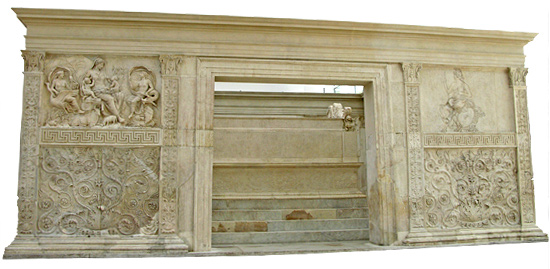
Turning west off the Via Flaminia, you walk toward the public entrance of the elegant Altar of Augustan Peace, decreed by the Senate on July 4, 13 BCE to celebrate the return of Augustus from 3 years in the western empire, establishing a peaceful reorganization in Spain and Gaul. The altar was dedicated on January 30, 9 BCE, the fiftieth birthday of Augustus's wife Livia (shown as the goddess Pax on a coin of Tiberius).
Here, at its east entrance, the altar is level with the street, so you walk directly up to the precinct walls, marveling at the beautifully carved reliefs over every surface, made by the best sculptors of the time and painted with bright colors over the Luna marble. The back of the sacrificial altar is flanked by enclosure walls with two panels whose mythological symbolism makes you reflect on significance of the peace that Rome has brought to the world. The panel on the left shows a beautiful mother goddess seated on a rock. She is surrounded by images of natural abundance, fertility and peace, with personifications of the winds (Aurae) of land and sea flanking her; a cow and sheep are at her feet and two infants sit on her lap, one at her breast and the other playing with the fruits on her knees. The tunic slipping off her shoulder suggests Venus Genetrix, claimed as mother of the Julian family, but the symbolism of this beautiful panel also reminds you of the earth goddess Tellus and the allegorical goddess Pax for whom the altar is named, first depicted on coins of Octavian and this altar but later broadened into the symbol of the Empire itself as Pax Romana.
On the right panel you see the military foundation of this peace, as the goddess Roma sits atop armor. Standing on either side are male personficiations of Honos and Virtus, representing the military valor and statesmanship that lead to honor, and you remember Anchises' solemn words to his son Aeneas characterizing the mission of Rome:
tu regere imperio populos, Romane, memento (hae tibi erunt artes), pacique imponere morem, parcere subiectis et debellare superbos. (Aeneid 6.851-53)
Remember, O Roman, to rule the nations with authority (these will be your arts) and to add civilized custom to peace, to make war on the arrogant and to spare those who have submitted.